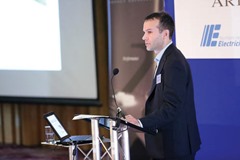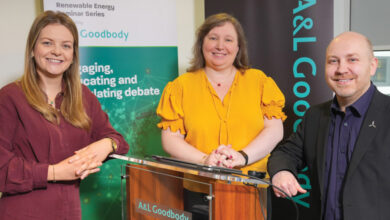Supporting innovation
 DECC’s Graeme Childe discusses UK Government support for low carbon energy technologies with Peter Cheney.
DECC’s Graeme Childe discusses UK Government support for low carbon energy technologies with Peter Cheney.
Northern Ireland’s businesses, entrepreneurs and researchers can apply for backing from the Department of Energy and Climate Change if they have innovations that can drive down the cost of energy. Graeme Childe, the department’s Head of Energy Innovation Co-ordination, explained the opportunities when speaking at the Northern Ireland Energy Forum.
He told agendaNi: “There’s some great opportunities for the UK industries across a range of low carbon energies, specifically those which have the greatest ambition for actually reducing the cost of energy, but also those which have economic benefit to the UK as well as supporting our greenhouse gas [reductions].”
Carbon capture and storage (CCS), in his view, could save £10-40 billion in the cost of energy by 2050. “Most of our schemes are UK-based,” he added, “and what we’re looking to do is see the best ideas for the biggest reduction of the cost of energy in the long term. The door’s very, very much open for Northern Ireland companies.”
Childe updated delegates on the Government’s support for innovation in low carbon technologies. Innovation is needed to adapt low carbon technologies to the UK’s needs and develop those technologies on which other countries are unlikely to lead. It can reduce the cost of commercial deployment, therefore making it more cost-effective for business to invest in infrastructure. Innovation can also grow UK companies and encourage others to locate their supply chains here.
In DECC’s view, high upfront costs, long timescales and high levels of uncertainty mean that private investment alone is unlikely to be sufficient to meet its aims.
DECC has prepared technology innovation needs assessments, for 10 areas of technology. A further assessment, for hydrogen, is due to be published by the end of the year.
£160 million has been allocated for energy research in the 2011-2014 Spending Review period. This includes maximum allocations of £35 million for an entrepreneurs fund, £30 million for offshore wind, and £20 million each for marine energy, CCS, buildings and energy efficiency, and electricity storage.
David Brown Gear Systems, in Huddersfield, was one example of a successful company mentioned by Childe. Its powertrain gearbox for 7MW offshore wind turbines has a compact design, which reduces the weight that the tower has to carry. This, in turn, will lead to the development of lighter nacelles, shorter turbines and ultimately lower material costs.
If trials prove successful, 150 units will be produced over the next five years and the potential order could rise to 650 units by 2020.
Childe also highlighted the Low Carbon Innovation Co-ordination Group, which seeks to maximise the impact of public sector funding and identify any potential areas of duplication. The Department of Enterprise, Trade and Investment is an associate member of the group and more information is available on its website: www.lowcarboninnovation.co.uk





